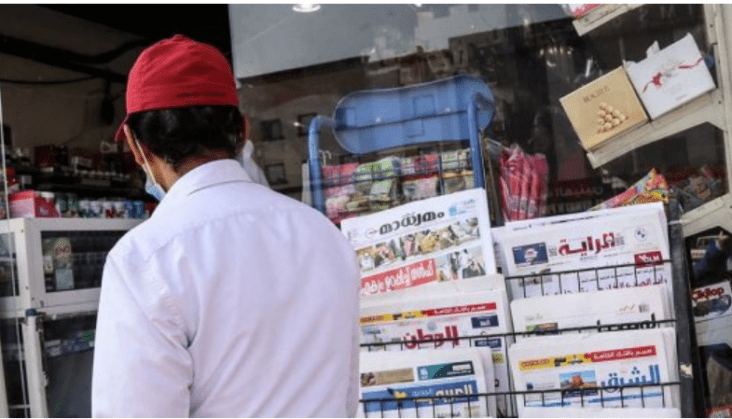
Iran may fear that restored unity amongst the Gulf countries might be used against it. However, it could also end up having more influence on the Gulf Cooperation Council.
A little more than three years after the blockade against Qatar was lifted, which began in June 2017, Riyadh and Doha seem to have finally buried the hatchet.
A reconciliation strongly encouraged by the US administration, mostly in an attempt to isolate Iran before President Donald Trump’s imminent departure, who throughout his term in office has waged a war of attrition against Tehran.
The lifting of the blockade against Doha would thus deprive Iran of the $100m that Qatar pays it yearly to use its air space, at a time when the country – already suffering from international sanctions – is in the midst of a deep economic crisis.
“Trump […] wanted to lock Iran up for as long as he could. However, the logic of exerting maximum pressure did not prevent Tehran from resuming the process of enriching its uranium,” says Sébastien Boussois, who has a PhD in political science and is the author of Pays du Golfe: Les Dessous d’une Crise Mondiale.
READ MORE Saudi Arabia ends its Qatar blockade, but dispute is not over
Similarly, the blockade against Qatar also failed. Accused by Saudi Arabia, Bahrain, Egypt and the United Arab Emirates (UAE) of supporting terrorism and of being too close to Tehran, Doha, which was shunned, then turned to Turkey and Iran.
“When relations with Saudi Arabia broke down, Iran opened its air space to Qatar as well as its sea routes. This allowed the emirate to be less dependent on Riyadh,” says Yasser Ershadmanesh, an Iranian journalist and researcher in international relations.
“While it is true that Iran has been able to benefit from sanctions [against Qatar], this renewal of diplomatic relations does not mean that Qatar will forget Iran so quickly,” he says.
According to Ershadmanesh, Qatari flights will not be completely suspended and will resume with the same regularity as before the sanctions.
“We had reached between 300 and 400 flights per day during the blockade. We should return to an average of 150 to 200 flights a day, the same amount as before 2017”, says the Iranian journalist.
The Saudi-Qatari reconciliation does not therefore imply a rift between Doha and Tehran. Not to mention the fact that Qatar shares with Iran the South Pars (North Dome) gas field, located in the Gulf and considered to be the largest in the world.
United against Iran?
For political scientist Boussois, Trump’s departure also marks the end of a bilateral relationship that benefited both Saudi Arabia and the UAE.
“With Trump, we were in transactional diplomacy. But despite being ostracised, Qatar has always played the game of multilateralism. So Doha will get along better with Biden than the Saudis and the Emiratis,” he says.
It is partly due to the imminent arrival of Joe Biden in the White House, in theory a person more concerned about respecting human rights and less hostile to negotiations with Iran than his predecessor, which pushed Saudi Crown Prince Mohammed Ben Salman to push for reconciliation between the Gulf countries.
Moreover, Saudi Arabia, which has been entangled in the war in Yemen since 2015, cannot afford a direct confrontation with Iran right now.
In this context, the lifting of the blockade and reconciliation in the Gulf may be an opportunity for Iran “if Mohammad Javad Zarif [Iran’s foreign minister] still has the energy to sit at the negotiating table,” says Boussois.
According to him, the renewal of diplomatic relations will also revitalise the Gulf Cooperation Council (GCC) and restore the place of Oman and Kuwait, two countries that have historically acted as mediators between the Gulf countries and Tehran. “The council will then be able to influence the reopening of a dialogue or not with Iran,” says Boussois.
Ershadmanesh goes further and says that Qatar could become an “ambassador of Iran” within the GCC. “Qatar will be an ally of Iran like Oman is already. The emirate will never take an aggressive stance against Iran and its presence will help to mitigate anti-Iranian positions within the council,” he says.
Qatar, the big winner
“The big winner is clearly Qatar,” says Ershadmanesh. Indeed, the emirate seems to have emerged from the crisis without having given in to pressure from its neighbours, even though the blockade has had a significant impact on its finances.
READ MORE UAE and Qatar reluctantly agree to reconcile
Although officially over, the crisis has left its mark and Qatar should not make any rash decisions regarding its partnerships with countries in the region.
“After what happened, Qatar does not have full confidence in Saudi Arabia,” says Boussois. As Ershadmanesh puts it, “the Qataris will not take the risk of putting all their eggs in one basket.”
https://www.theafricareport.com/59475/is-iran-the-big-loser-from-reconciliation-efforts-in-the-gulf/


